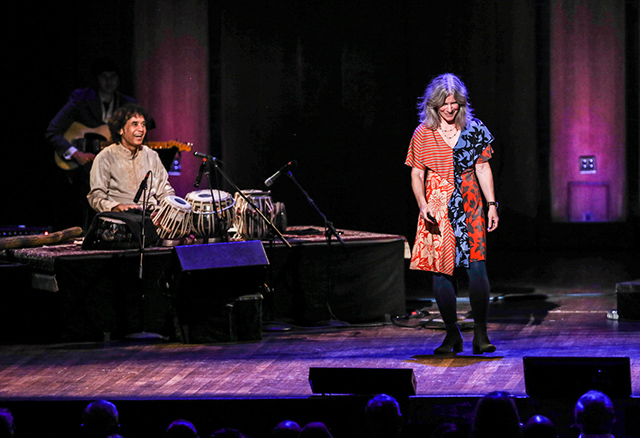Back by popular demand, Northwestern University auditory neuroscientist Nina Kraus took the stage at The John F. Kennedy Center for the Performing Arts in Washington, D.C., last weekend in the second annual Sound Health: Music And The Mind, a partnership between the National Institutes of Health (NIH) and the Kennedy Center.
Kraus joined music legends Grateful Dead drummer Mickey Hart, renowned soprano Renee Fleming (Northwestern’s 2018 Commencement speaker), jazz pianist Jason Moran, tabla virtuoso Zakir Hussain and NIH Director Dr. Francis Collins to explore the connection between music and wellness with a particular focus on rhythm.
On Friday, Sept. 7, Kraus, the Hugh Knowles Professor in the School of Communication, talked about sound processing in “healthy and hurting brains,” how making music is biologically healthy, and how sound processing in the brain is disrupted by concussion and can be used to inform athlete health.
Kraus spoke about the rhythm in language as part of a performance in which Hussain drummed along to Kraus’ spoken voice, Fleming sang “Children Will Listen,” Hart demonstrated the rhythms of a rainforest, and Moran played a “Brain Keyboard” -- a Kraus Lab intersection between science and art, where the brain's response to each note of the keyboard was turned into a song.
The following day, Sept. 8, Kraus spearheaded “Say it with Rhythm!,”a workshop on the topic of how the brain keeps track of and sorts out the ever changing rhythms of life, interwoven with rhythmic interactions with Zakir Hussain and Mickey Hart. The promise of “digital music medicine” was discussed, with Mickey and Zakir competing on Interactive Metronome.
The performers shared the spotlight with leading scientists and medical doctors to explore what can be learned from studying rhythm’s interaction with the brain, and what both healthy and hurting brains can tell us about rhythm’s impact on communication.
“It was wonderful to bring together outstanding musicians and a broad-based cross section of scientists and physicians,” Kraus said.
“We know music can be used to improve language development in children, offset aging and provide remediation of traumatic brain injury,” added Kraus, who is the director of the Auditory Neuroscience Laboratory at Northwestern and an amateur drummer. “But there is so much more to learn about how deeply music and rhythm impact the brain. We do know that developing musical knowledge at a young age is so important.
“Our NIH-funded work with athletes reverberates with my family history. My uncle, Hans Kraus, was a physician on the President's Council of Physical Fitness, fittingly, under President Kennedy, that promoted fitness standards for American school children. He recognized that not every child would grow up to be an accomplished athlete, but all would benefit from being strong and flexible. I see music education in this way. Very few children will grow up to be Renee Fleming or Mickey Hart. But, speaking as a scientist, we would do well to make it possible for every child to make music to strengthen brain health.”


